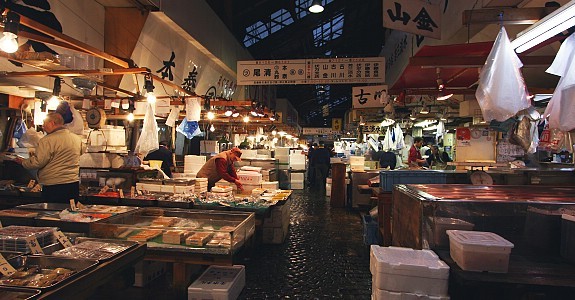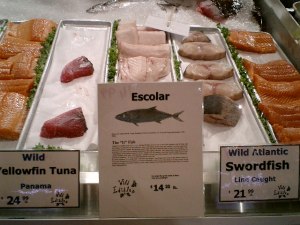By Jessica Jang
With oceans covering over 75% of Earth’s surface, nearly one billion people depend on seafood for sustenance. As more people continue to add seafood into their diets, our seafood resources are becoming depleted. Some seafood such as bluefin tuna are very valuable, resulting in unmanaged fisheries. To keep up with the demands and profits, products are purposely being mislabeled in hopes that the consumers will continue buying these products. Today, around 25 – 75% of the seafood we consume is mislabeled. This is an alarming issue, as seafood fraud encourages increased illegal fishing activities and impairs consumers right choices in seafood and can impact our health.

Seafood fraud
What is Seafood fraud? It is the act of purposely mislabeling seafood products. Common and undesirable species (perch, tilapia, and escolar) have their names changed to a higher quality fish such as red snapper, cod, salmon, or tuna. This lucrative practice has encouraged illegal, unreported, and unregulated fisheries (IUUs), which can threaten seafood stocks that other countries depend on for their livelihood. These fisheries violate the EEZ (Exclusive Economic Zone), which gives a nation or country special rights to explore, conserve, exploit, and utilize marine resources within 200 nautical miles from their coastline. IUU fisheries have harmful fishing practices that catch protected species, or use fishing equipment that can destroy marine habitats, making them unsuitable for nurseries or tourist attractions.

Healthy seafood? Not really.
Fish eat at different levels of the food web. Depending on their diets, many fish contain different amounts of toxins. Some species of fish are more prone to accumulating toxins such as Dioxins , Polychlorinated biphenyls (PCBs), Perfluorinated compounds (PFCs), and Mercury (Hg), than other species. These toxins, once in the body, can accumulate in tissues (muscles, liver, or gonads) and take a long time to break down. Furthermore, studies have found that many of these toxins are correlated with paralysis, diseases, and even cancers. The US Environmental Protection Agency (EPA) has posted basic information about these specific toxins and which seafood groups have these toxins: Dioxins, PCBs, PFCs, Mercury
By intentionally mislabeling fish, consumers can increase their chances of consuming these harmful toxins.

Escolar: The Ex-lax Fish
Take the escolar case study for example, this fish is considered dangerous to eat, yet it is often served at expensive restaurants. It is often mislabeled as ‘white tuna’, ‘butterfish’, and various others as it has a similar buttery consistency. Escolars have an oily diet causing them to be rich in a toxin called gempylotoxin. Consumption of this toxin is known to cause severe gastrointestinal (diarrhea, keriorrhoea) and abdominal problems. Countries like Japan and Italy have banned the sales of escolar, while other countries only require warning labels. The US Food Drug Administration (FDA) have issued warnings of the risks of consuming this fish, however, it has not been banned or taken off the market since the fish is considered non-toxic. Escolar is still sold and served in the United States but cannot be sold between states.

What Can You Do?
Many people want to make eco-friendly seafood choices, but seafood fraud makes it difficult for consumers to choose seafood that have less environmental impacts or are caught from reliable sources. So what should consumers do to combat seafood fraud? There are petitions that people can participate to voice their concerns about IUUs and seafood fraud. The most recent one is by Oceana
Petitions such as Oceana’s have caused many governments to recognize the issue of seafood fraud and to act on it by implementing monitoring programs for their commercial fisheries.
By educating the public about seafood fraud, individuals can become more aware and make a difference. There are many organizations that advocate against seafood fraud and encourage conserving our marine resources. Organizations such as Seafood Watch, Oceana, FishWise, Ocean Wise, Marine Stewardship Council, Food and Agriculture Organization, and FishWatch provide updated news, research, and guidelines that are accessible to the public. Below are links describing these organizations in-depth and their goals, along with a list of seafood that are commonly mislabeled. Seafood fraud will not end, but if consumers continue to become educated and aware of the urgent situation, they will have the power to pressure their governments to enforce regulations on this matter.
If you love seafood, then also support the LOCAL fishermen , get to know them and learn where they caught the seafood and the availability! Ask the fishmonger at your local supermarkets where the fish came from, if they don't know, avoid purchasing that fish. Consumers have the power to pressure companies to regulate Seafood fraud!

